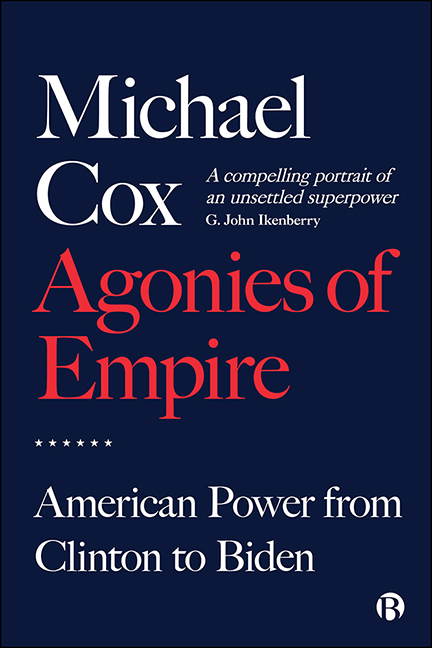Book contents
- Frontmatter
- Dedication
- Contents
- About the Author
- Preface
- Introduction: The Rise of an Empire
- PART I Clinton: Liberal Leviathan
- PART II Bush Jnr: Empire in an Age of Terror
- PART III Obama: Towards a Post-American World?
- PART IV Trump: Turbulence in the Age of Populism
- PART V Biden: Is America Back?
- Notes and References
- Acknowledgements
- Index
PART I - Clinton: Liberal Leviathan
Published online by Cambridge University Press: 15 September 2022
- Frontmatter
- Dedication
- Contents
- About the Author
- Preface
- Introduction: The Rise of an Empire
- PART I Clinton: Liberal Leviathan
- PART II Bush Jnr: Empire in an Age of Terror
- PART III Obama: Towards a Post-American World?
- PART IV Trump: Turbulence in the Age of Populism
- PART V Biden: Is America Back?
- Notes and References
- Acknowledgements
- Index
Summary
I became engaged in thinking about Clinton's foreign policy largely because I could not understand why so many American writers on the subject had very little that was positive to say about what he was attempting to do in a world no longer shaped by the Cold War. ‘Incoherent’, ‘lacking in strategic clarity’ and ‘without direction’ were perhaps some of the more charitable things said about the former governor from Arkansas who was now sitting in the White House. Some of the criticism was reasonable enough. But a good deal of it, I felt, either came from realists who did not much appreciate a liberal running US foreign policy, or Republicans who were unhappy that Bush Snr – a foreign policy president if ever there was one – had lost the election in 1992 to someone who by his own admission had little or no international experience. Either way, what I set out to do was try and make sense of how the Clinton administration tackled some of the big challenges facing the US. Three seemed to me to be critical at the time, the most important of which was how to develop a ‘grand strategy’ that would allow the United States to compete more effectively in an increasingly globalized economy. Linked to this was a second initiative: the promotion of democracy both as an end in itself but also as a means of achieving international stability and global prosperity. And the third piece of the puzzle – on which Clinton spent an inordinate amount of time – was how to bring about a transition in post-communist Russia so as to prevent it becoming (as it subsequently did under Putin) an authoritarian enemy of the West.
- Type
- Chapter
- Information
- Agonies of EmpireAmerican Power from Clinton to Biden, pp. 5 - 6Publisher: Bristol University PressPrint publication year: 2022

